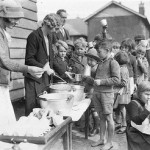Seems like these days everyone has something to say about good teaching. Davis Guggenheim thinks that good teaching is about filling kids' brains with information, like pouring a can of soup into a pot. Michelle Rhee thinks that good teaching (which she doesn't think happens that much in DC) is expressed through standardized test scores. Teach For America thinks that good teaching can be figured out in two years. And Diane Ravitch thinks that good teaching is good only as long as it doesn't happen in a charter school. So many informed opinions out there, it's hard to make sense of them all.
One way schools gauge good teaching is through evaluation systems. Now that the nation is embracing a teacher evaluation model that relies almost completely on standardized test scores, it has become increasingly more important for my colleagues and I to stand firm in our commitment to our complicated, hard to quantify, and oftentimes messy definition of what good teaching is.
I know it sounds nutty, but I thought I'd ask a real-live teacher what he thinks good teaching is.
Meet Chad. He's a high school English teacher in Tucson, AZ.
Chad, How would you define good teaching?
Good teaching makes the students feel valued, and helps them connect their learning to their personal growth and to the growth of the community and the world. Good teaching provides students opportunities to grapple with difficult issues, it allows for creative solutions, and it makes students reconsider assumptions. Good teaching is flexible and can adjust to the needs of each individual student, and it provides students with the tools and motivation to teach themselves.
How do you know when you are being a good teacher?
I know when I am being a good teacher when I can stand back and watch my students be engaged and when students are asking each other good questions, when students are finding connections between the lessons in the classroom and what they read about or experience outside of the classroom. When I change negative behaviors with a thoughtful and kind conversation, and am really excited at both the beginning and end of class, that's when I know I've been a good teacher.
Some folks think that it's unwise or not possible for a coach and an evaluator to be the same person. Any thoughts on this?
I am going to respond best to a coach or evaluator who knows me well, who recognizes my strengths as a teacher, and is invested in helping me become a better teacher. I don't see an inherent divide between evaluating and coaching. Evaluation should be process driven, not product driven. A coach will most likely have a better understanding of my strengths and weaknesses and what I've done to address and incorporate both into my teaching.
Anything else you care to add?
The best case scenario for coaching and evaluating is when a teacher is able to experiment during an observation, to break out of their comfort zone so that the observer can help them improve in areas where the teacher is not excelling. Too often, when being observed, teachers fall back on a tried and true lesson plan in order to impress the observer. Ultimately, this does little to create a process oriented discussion afterwards; it only conditions existing skills. It does not help the teacher reflect on new and less practiced techniques, strategies, or skills.
—
At a Microsoft conference for educators last summer I got to take home a bunch of pink erasers (I was hoping for something sleeker). The erasers read "make mistakes". The folks at one of the most successful corporations on the planet know that mistakes lead to great ideas and that they should be made regularly. We need to start rewarding innovation and risk-taking if we want good, or even great teachers. And yet those are the very things that will be punished if we think that a standardized test taken by a hungry or moody teenager can tell us everything we need to know about good teaching.








